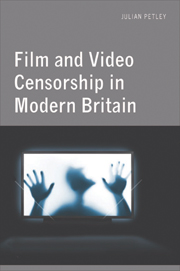Introduction
Published online by Cambridge University Press: 05 August 2013
Summary
Britain, along with the Republic of Ireland, has the strictest film and video censorship in the European Union. This book will attempt to explain how this situation has been maintained, and indeed strengthened, in recent times, how the censorship system actually works, and why it is maintained.
Part I examines the origins of the Video Recordings Act 1984 (VRA), and situates these firmly in the moral panic about ‘video nasties’ which commenced in 1981. Part II looks at how the Act was interpreted in the second part of the decade, and at some of its consequences for the video industry. Part III, the longest part, deals with the 1990s, and begins by focusing on why and how the Act was amended in the wake of the murder of James Bulger; it then goes on to analyse how the British Board of Film Classification (BBFC) interpreted the amended Act. Much of the book thus far will have been taken up by accounts of how the majority of British newspapers played a key role in the processes that resulted in the Video Recordings Act coming about in the first place, and then being tightened. However, Chapter 10 shows how the Daily Mail and its stable-mate the London Evening Standard signally failed in their campaign to get David Cronenberg's film Crash banned from cinemas nationally. And Chapter 11, too, charts the failure of an attempt, this time by government (albeit aided by newspapers), to impose stricter censorship on the already heavily regulated ‘R18’ category of videos (those which may be sold only in licensed sex shops).
- Type
- Chapter
- Information
- Film and Video Censorship in Modern Britain , pp. 1 - 14Publisher: Edinburgh University PressPrint publication year: 2011



